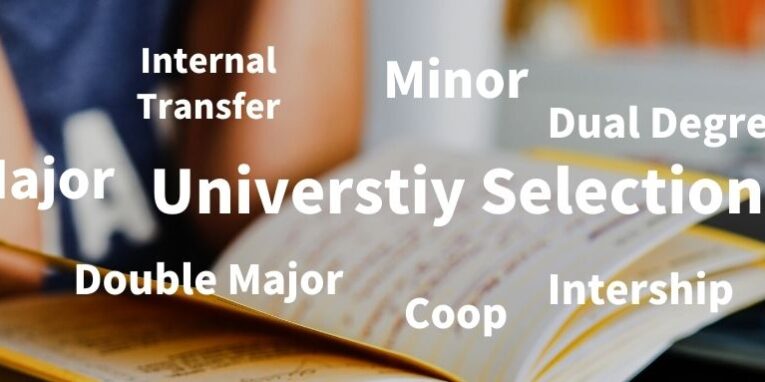Blog 14 – Compromising Dream Major for Dream University?
A common question that I hear from parents is that “should my daughter choose a major over a university, or choose a university over a major?”
If you are choosing between an engineering offer from the University of Toronto (U of T) and a Sauder Business school offer from UBC, I would suggest you pick the major you are interested in, since both U of T and UBC are prestigious universities. However, in most cases, I would suggest students choose a better university. University is not just a place for mental adventures. After all, the better the university, the better the professional network opportunities, the more industrial connections, and the better the career resources.
Life becomes easy with this simple rationale, but a more urgent question emerges, “what about my future career if I didn’t enter the major I want?”
Suppose there is a student who wants to study engineering and his dream school is UBC. However, he only received offers from UBC’s Faculty of Arts and SFU’s School of Engineering Science. You can come up with many arguments to select one offer over the other. Nevertheless, if the student chooses UBC over SFU, what can he do as an undergraduate to chase his dream as an engineer? In this blog, I will provide with some insights for students who compromised their preferred major to enter a better university.
Insight No.1 – Focus on Skills, Not the Major
In my other blog, we talked about how your university degree signals your capability and how employers rely on such signals to reduce the risk of hiring unqualified members. Therefore, by holding a diploma from a reputable university, you automatically signal that you are an intelligent, hard-working individual with high self-discipline. However, how can you meet other job-specific qualifications if your major does not prepare you holistically?
Most students are highly aware of their majors, but many of them are unconscious of what specific skills are developed through the process of pursuing their degrees. Students are suggested to learn as much about the job market as possible to know the required skillsets for their dream jobs. With such understanding, students are encouraged to gain those skills through extra-curricular activities, internships, Coop experience, elective courses, etc. For example, an Arts student can still seek a data analyst career path by taking a coding boot camp in the summer while taking the advantage of the Coop opportunity in a tech company. By the time the student graduates, he is equipped with sufficient skills to qualify for a potential job posting.
More importantly, selective universities provide students with professional career support, and access to a network that gets students top job opportunities, regardless of their undergraduate majors.
Insight No.2 – Redesign Your Degree
The majority of today’s universities offer undergraduate programs with the flexibility to redesign. You can choose to pursue combined majors, double major, major + minor, or dual degrees (See Blog 13).
When considering what majors or what minor to join, Richard N. Pitt, an associate professor of sociology at Vanderbilt University suggests students consider unrelated subject areas. Complementary majors with overlapping requirements are easier to juggle, but two unrelated subjects probably yield bigger gains in the job market since it increases your knowledge breadth significantly (Selingo, 2017).
Additionally, if your major was already dissenting with your career perspectives or is less marketable, choose a minor that counterbalances the uncertainty of the career path led by your major. For example, if you wanted to enter UBC Sauder Business School without success, do a major in the olive branch-extending-faculty but add a minor in business, organizational leadership, or communication.
Insight No.3 – Faculty/School Transfer
The first obvious piece of advice for a student who compromised his major in order to enter the dream university is to request a faculty transfer or change of major midway through his undergraduate study. However, the achievability of this goal highly depends on the structure of the university, the specific programs, and your GPA.
For example, if your offer is from Harvard, you don’t need to worry much about your major. Harvard College is very flexible. While offering over 50 different concentrations (Harvard calls a major a concentration), about a third of undergraduates change fields after declaring their concentrations at the end of their sophomore year (Harvard College, 2022).
However, if you want to transfer to the UBC Sauder Bachelor of Commer program from UBC the Faculty of Arts, in addition to the GPA and course requirements, you need to go through the admission process again. That means you need to write your personal statements, prepare the supplementary essays, and pass the interview. The entire process will only be as stressful as your university applications as a Gr. 12, if not more stressful.
Summary
University application is more of a strategic game than submitting good grades. Students must learn as much as the intended universities as possible. Compare and contrast universities and programs, and make a strategic decision on how to progress to maximize your experience. If you are interested, we can talk more about transfer between post-secondary institutions, and internal transfer.
Reference
Selingo, J. J. (2017, November 4). Six Myths About Choosing a College Major. The New York Times. https://www.nytimes.com/2017/11/03/education/edlife/choosing-a-college-major.html
Harvard College. (2022). How easy is it to change my concentration? Harvard College. https://college.harvard.edu/resources/faq/how-easy-it-change-my-concentration








